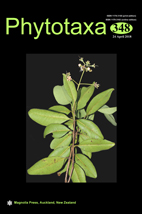Abstract
During fungal surveys in a small urban Protected Area in Southern Brazil a species of Phylloporia was found with its minute basidiomata emerging from living stems of Doliocarpus schottianus. It is characterized by pileate and strikingly small basidiomata, context with a black line separating an upper tomentum, 3–7(–8) pores per mm, a monomitic hyphal system and ellipsoid basidiospores. In phylogenetic analysis based on partial nuclear 28S ribosomal DNA sequences, these specimens are resolved as a new clade within Phylloporia. The species is therefore described as P. minuta sp. nov. Ecological data (host and distribution) and the importance of small and urban protected areas are discussed

